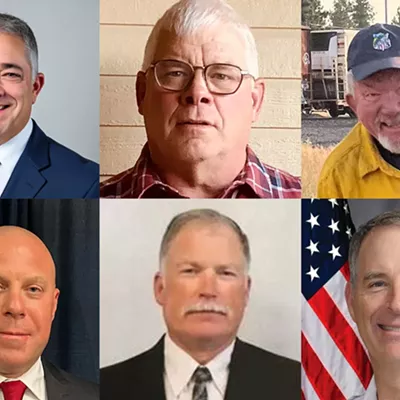His wife, Lucille, expands upon that story: "I felt like, all of a sudden, we were connected at the hip. Every time I went to the store, he said, 'I'll go with you.' Every time I'd try to vacuum, he'd say, 'Do that later, I'm watching a program.'"
She told him all she needed was four hours a week -- "just four hours a week," she emphasizes -- to get her work done. That short time spent "unconnected at the hip," quickly turned into full-time volunteering. Now, some 13 years later, says Lucille, "I don't even see him for four hours a week."
Bob volunteers between 120 and 160 hours a month. For July, he says, referencing a chart meticulously detailing his days, it was 133 hours. He splits that time between the Red Cross, the Inland Northwest Blood Center and Cancer Patient Care (CPC), an organization that focuses on helping low-income patients cope with the disease.
He rides along with the bloodmobile once a week, devoting three days to the Red Cross, where he handles logistics. Overseeing the supplies is important because, he says, "you need one person making sure you have exactly what you need." This is especially important to nonprofits, where funding is always a constraint. The Red Cross in Spokane is responsible for Disaster Action programs in Spokane County and six other Washington counties. They also service Boundary and Bonner counties in Idaho. With a reach that wide, it's important to maximize every dollar.
So Bob keeps scrupulous track of everything, including the maintenance of the vehicles. He seemingly commits it all to memory. "I track the mileage and make sure they have oil and everything is running properly," he adds. "Sometimes I give them a wash." One old Dodge van, with a big round siren like you'd see in episodes of The Dukes of Hazzard, doesn't get much use. No one likes to drive it because of its age, "but it's only got 43,000 miles," he says, off the top of his head.
As Bob walks me through rooms he has filled and organized with supplies for setting up shelters and providing relief, he spends very little time philosophizing about volunteer work. "This is something you do," he says simply, "to give back."
He spends the rest of his time at Cancer Patient Care, where he volunteers alongside Lucille. Though she never says it outright, I get the feeling that those four hours a week Lucille sees Bob are the ones they spend here, comforting people whose struggles with radiation and chemotherapy are made worse by severe financial hardship.
She seems more comfortable than Bob about assessing the impact of their work and the reasons for doing it. "Cancer is devastating," she says. "There's lots of cancer in both our families, and I was low-income when I was young, so I understand. There are so many things you can't get if you're poor and you don't have insurance."
She and Bob were drawn to Cancer Patient Care because the organization seeks to provide patients with things that are often overlooked or out of reach, like wigs. When the Reimers began volunteering, the wig room (which also contained prosthetics, scarves and blankets), was little more than a closet full of boxes. CPC's Development Director Rebecca Bishop says the couple transformed it into a boutique, finding outside funds to paint the walls, install carpet and buy shelves. It seems like a simple thing, but Lucille believes the room (now named in the Reimers' honor) helps people recover. "When people go in, they're down-hearted and feel like they don't look very good," she says. "It just uplifts them and gives them a good feeling. It's absolutely therapy, like a good laugh."
Buoyant throughout our conversation, Lucille's tone turns somber when discussing the need for volunteers. "It's so important," she says. "Anyone who has extra time -- it doesn't have to be cancer, it doesn't have to be at the Red Cross. A person doesn't have to sit around and wonder if they can do anything to help. They can, and they're needed."
The best evidence of that need is how CPC and the Red Cross guard the Reimers like a rare natural resource. Pat Mosely, executive director of the Inland Northwest Red Cross says, with a smirk, "We very reluctantly share Bob." Bishop echoes that, noting that the pool of hardcore volunteers in Spokane is small but vital. "You will bump into the same giving, caring people in nonprofits around Spokane," she says.
As long as they're able, it seems, the Reimers will be there to pitch in a few hundred hours a month. Helping has become a vital part of their lives. Bishop remembers talking to Bob and Lucille recently about a two-week cruise they were about to take. She remembers Bob struggling with the idea: "I said, 'two weeks, Bob?' He said, 'I know, I'll see if I can make it.' I said, 'After a day, you'll be up there running bingo.'"
If nothing else, he probably made sure the bingo hall had all the supplies it needed.















